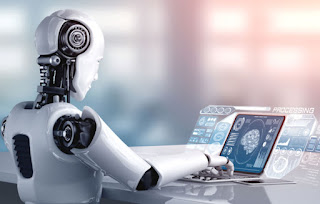The Ethics of AI: Balancing Innovation and Responsibility in the Age of Artificial Intelligence
The Ethics of AI: Balancing Innovation and Responsibility in the Age of Artificial Intelligence
Artificial Intelligence (AI) has made
tremendous progress in recent years, revolutionizing industries and transforming
the way we live and work. As AI continues to evolve and become more complex, it
raises important ethical concerns that must be addressed. In this article, we
will explore the ethics of AI and the need to balance innovation with
responsibility in the age of artificial intelligence.
What is Artificial Intelligence (AI)?
Artificial Intelligence is the development
of computer systems that can perform tasks that would typically require human
intelligence. AI is designed to learn and improve over time, making it an
essential tool in industries such as healthcare, finance, and transportation.
AI systems can analyze large amounts of data and make predictions, helping
businesses make informed decisions and improve efficiency.
The Importance of Ethics in AI
Ethics plays a crucial role in the
development and implementation of AI. As AI becomes increasingly sophisticated,
it raises important ethical concerns that must be addressed. For example, AI
systems can be biased, reflecting the values and preferences of their creators.
Bias can lead to discrimination and unfair treatment, which can have serious
consequences.
Furthermore, AI systems can be used to
invade privacy, manipulate public opinion, and even cause harm. These ethical
concerns highlight the need for responsible development and implementation of
AI technology.
The Ethical Concerns Surrounding AI Technology
There are several ethical concerns
surrounding AI technology. One of the primary concerns is the potential for AI
systems to replace human workers. As AI becomes more advanced, it can perform
tasks that were previously done by humans, leading to job losses and
unemployment.
Another concern is the potential for AI to
be used for malicious purposes, such as cyberattacks or the creation of
autonomous weapons. AI can also be used to create deepfakes, which are
manipulated videos or images that are designed to deceive viewers.
Additionally, there are concerns about the
accuracy and bias of AI systems. AI systems can be biased based on the data
they are trained on, leading to unfair treatment and discrimination. As AI
becomes more prevalent in society, it is essential to address these ethical
concerns and ensure that AI is used responsibly.
Balancing Innovation and Responsibility in AI
Balancing innovation and responsibility in
AI is essential to ensure that the benefits of AI are realized while minimizing
its negative impacts. Responsible AI development involves considering the
ethical implications of AI systems and ensuring that they are developed in a way
that is fair, transparent, and unbiased.
Furthermore, responsible AI implementation
involves considering the impact of AI on society and ensuring that AI is used
in a way that benefits everyone. This includes ensuring that AI systems are
accessible to all and do not discriminate against any groups.
The Impact of AI on Society and Employment
AI has the potential to transform society
and bring about significant benefits. For example, AI can help diagnose
diseases, improve transportation, and enhance education. However, AI also has
the potential to disrupt industries and lead to job losses.
As AI becomes more advanced, it is
essential to consider the impact on employment and ensure that workers are not
left behind. This includes providing education and training to workers,
ensuring that they have the skills needed to thrive in a world of AI.
AI Art and its Ethical Implications
AI art is a new field that is emerging as
AI becomes more advanced. AI art involves using AI systems to create art, which
raises important ethical questions. For example, who owns the copyright of
AI-generated art? Is AI-generated art as valuable as human-generated art?
Furthermore, AI art can be used to create
deepfakes, which can be used to deceive viewers. As AI art becomes more prevalent,
it is essential to consider the ethical implications and ensure that it is used
responsibly.
The Role of Government and Industry in Regulating AI
The responsible development and
implementation of AI require collaboration between government, industry, and
academia. Governments have a crucial role to play in regulating AI and ensuring
that it is used in a way that benefits society.
Industry also has a responsibility to
ensure that AI is developed and implemented responsibly. This includes
considering the ethical implications of AI systems and ensuring that they are
developed in a way that is fair, transparent, and unbiased.
The Future of AI and its Ethical Considerations
The future of AI is exciting, with the
potential to transform industries and bring about significant benefits.
However, as AI becomes more advanced, it raises important ethical
considerations that must be addressed.
In the future, AI will continue to play an
increasingly important role in our lives, from healthcare to transportation to
entertainment. It is essential to ensure that AI is developed and implemented
in a way that benefits society and minimizes its negative impacts.
Conclusion: Striking a Balance Between Innovation and
Responsibility in AI
In conclusion, the ethics of AI are complex
and multifaceted, requiring careful consideration and responsible development
and implementation. Balancing innovation with responsibility is essential to
ensure that the benefits of AI are realized while minimizing its negative
impacts.
As AI continues to evolve and become more
complex, it is essential to consider the ethical implications and ensure that
it is used in a way that benefits everyone. By striking a balance between
innovation and responsibility, we can harness the power of AI to transform our
world for the better.

Comments
Post a Comment